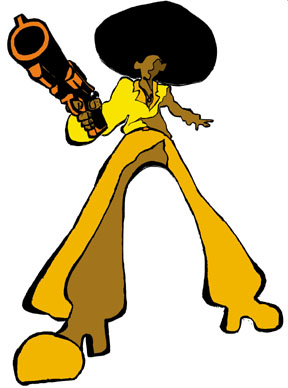Blax to the Future
Blaxploitation isn't just 70s leftover
By Alex De Grand
Awwwwww, yeah!!!
Blaxploitation is back!!!!
If you're saying that, you might want to keep it to yourself.
Blaxploitation isn't "back;" it never left - according to Aimeé Ellis of the University of Kentucky's English department.
Ellis, a professor of 20th century American literature, cultural studies and critical theory, explains black America has held onto the genre over the decades.
Listen to hip hop music from Snoop Dogg to the Roots and you'll know the phenomenon didn't fade away even though mainstream white America wandered off to a different drummer. (Perhaps it was to whiter-than-white drummer Phil Collins.)
And in addition to living on through music, videotape has made readily accessible this cinematic chapter of American history, according to Greg Waller, a UK English professor specializing in film.
But for the bulk of white America, the new Shaft movie - coming to a suburban mall near you - marks a splashy look back at blaxploitation.
Of course, blaxploitation can be a tricky word. Technically, the term refers to the pack of low-budget 1970s films that prominently featured black characters typically in urban settings. You don't have to be terribly astute to notice "sticking it to the Man" is a recurring theme in these flicks.
For some, the movies are saluted for giving expression to the post-Civil Rights attitude found among urban blacks who never really identified with the integrationist message presented by Sidney Poitier.
(Samuel Jackson has told interviewers that John Shaft gave him a role model, as a young black man, and as an actor. Unlike Poitier's characterizations of quiet dignity, Shaft represented the HERO that white audiences had long had in John Wayne and his ilk.)
Also, the films are applauded for putting black actors and directors to work.
But for others, like Chester Grundy, the director of African-American student affairs at UK, there is a reason why the term is the shotgun marriage of "black" and "exploitation."
"I see blaxploitation films as that genre of films using distortions, misrepresentations and stereotypes to represent black life," Grundy said. "To those who argue, 'They keep people working,' I answer, 'So does slavery.'"
Ellis acknowledges many of these criticisms, but he credits blaxploitation with offering a set of heroes at a time when black leadership was weeded out by assassination, prison and government harassment. The films offered an important "oppositional" element for its audiences, he said.
"Shaft was out of the mold of George Jackson; Pam Grier was out of the mold of Angela Davis," Ellis said.
Ellis spoke regretfully of the absence of such a shared political sensibility in the black community today. That loss of collective aspirations has left black Americans adrift in an every-man-for-himself political and economic climate that only works against improving the community, Ellis said.
"Very few black Americans hold onto their progressive [ideas] when they gain access to power," Ellis said, noting Muhammad Ali was one of the few to resist a comfortable conformity when he took a stand against the Vietnam War despite the risk to his career.
Interviewed before the release of the new Shaft, Ellis said he is excited, but concerned about what the contemporary treatment of the hard-boiled black detective will include.
"There's an expectation of revitalizing a black hero who looks white America in the face and doesn't flinch," Ellis said. "A black hero who is autonomous economically, politically and culturally."
But having seen the TV commercial for the film where Samuel L. Jackson, as the newly minted Shaft, proclaims "It's my duty to please the booty," Ellis shudders at the thought of the return of the "black patriarch."
There's no need for the "phallic, hypersexualized black male" stereotypes of the 70s to come along for the ride, he said. Ellis admitted there is a certain testosterone level inherent in the action film genre, but he said the new Shaft should avoid the sexism found in the original film.
Grundy agreed with Ellis that Shaft could fill a need for black America given the contemporary climate boasting a surplus of negative media images and precious few heroes.
"People were inspired and uplifted by a black superhero who, despite some flaws, was fighting for something approaching righteousness," Grundy said.
Grundy explained the first wave of black films in the 70s was a "mixed bag" with some good films and other "quickie films" with caricatures for characters and thin plots - the ones he labels "blaxploitation."
"Some of the stuff in those old films is funny now," Grundy said. "There was no complexity in the way characters were drawn in those exploitation films."
"I'm optimistic that 30 years of experience will show up in a new wave of black films," Grundy said.
For his part, Ellis said he hopes the new Shaft features as exciting a soundtrack as the original movie.
"I hope the soundtrack is memorable, but they'll probably just put the Goo Goo Dolls or Will Smith on it," he said.
(down right)
By Rob Bricken
"This could be interesting, or this could be a disaster," said Samuel L. Jackson, on the thought of a sequel to the 1971 blaxploitation giant Shaft.
Such careful thinking by the lead indicated his careful approach to remaking the cult favorite; it seems to have paid off in this version. Jackson has the presence needed to portray the huger than huge John Shaft; he's got the charisma, the charm, and of course the major shit-talking, an aspect not to be over-looked.
And yet Shaft-the modern Shaft-is not without its problems.
To clarify: the 1971 Shaft was a black superhero in the most patriarchal sense-confirming his rank among black culture while lording it over the ladies, and of course, sticking it full to the Man.
Flash to the year 2000 and it's a hard task to remind Whitey, the general movie-going public, that they're now the Man. That makes the Man uncomfortable, and the Man buys a lot of popcorn. But stickin' it to the Man is a fair chunk of the original concept of blaxploitation.
Director John Singleton, along with uber-star Jackson, have turned Shaft into a modern compromise of blaxploitation, but this doesn't mean the film is culturally bankrupt. It is safe to say that the 2000 Shaft is much more of a Summer Movie than a modern representative of the films of the '70s.
The Man has been pared down to the Racially Insensitive Rich White Kid, who commits a racially-motivated murder and gets John Shaft on his heels.
(That is, John Shaft... the police officer nephew of the famous detective John Shaft, played again by Richard Roundtree). There's a witness who won't testify, a drug dealer Shaft messes with who then tries to mess with Shaft, and a plot that is reasonably smart enough to seem like Citizen Kane next to all the other summer fare.
But the movie is not about the detective drama...it's about Shit-talkin'.
Which is what Jackson does so very well. Many times in Shaft you get the feeling that you're seeing what happened to Jules after he left that diner at the end of Pulp Fiction.
It's not very Shaft-like. But it's totally entertaining, and a legitimate way to bring forth the Stickin'-it-to-the-Man quality of the previous film. The new Shaft talks a lot of shit. He fucks with a lot of people who deserve fucking with. And Jackson, like Roundtree before him, plays Shaft as the requisite badass, totally cool in every situation. Satisfying to the extreme.
On other counts, Shaft gets a Big Score as well. The music is all wa-wa pedals and flutes, a metric ton of wokka-chicka-wokka-chicka, and even Isaac Hayes is back for the main title song. No funky new hip-hop gangsta rap updates for John Shaft, but the same groovin' tunes. The action is well-filmed, and it's kind of disturbing how great the meaty impact of bullets sound in this film.
The cast works well, the most gratuitous entry (if any) being Vanessa Williams as Shaft's police partner and friend. But it's no big deal. Gordon Parks makes a cameo. And for anyone who is pissed and thinks Jackson is wrong to play Shaft there are two words: Will Smith. So shut yo mouth.
In the end, Shaft is a satisfying Summer Movie. What it is not is old-school blaxploitation. But the update of the blaxploitation genre is not without its merits. While Jackson is assumably the sex machine to all the chicks, the chicks are not cheapened or denigrated, nor is the black male hierarchy, celebrated so absolutely in the films of the '70s, present (a good thing). And while the Man is absent, Jackson's Shaft sticks it to a quite cosmopolitan assortment of races. Really, he sticks it to anyone who gets in his way, regardless of race.
While director Singleton (of Boyz in the Hood fame) may receive some flack for not venturing on more dangerous racial ground, especially with a remake of Shaft, he does point out the Man's System is still working for the Man, and Shaft has to combat this (less obtrusive) menace. Anyone criticizing Singleton does need to recognize this Shaft as undeniably a Summer Movie-for everyone, including Whitey. New ground is not broken, and a cultural landmark is not reached. But Shaft is a good reason to buy some popcorn and hear some major shit talked. But he's just talkin' bout Shaft.